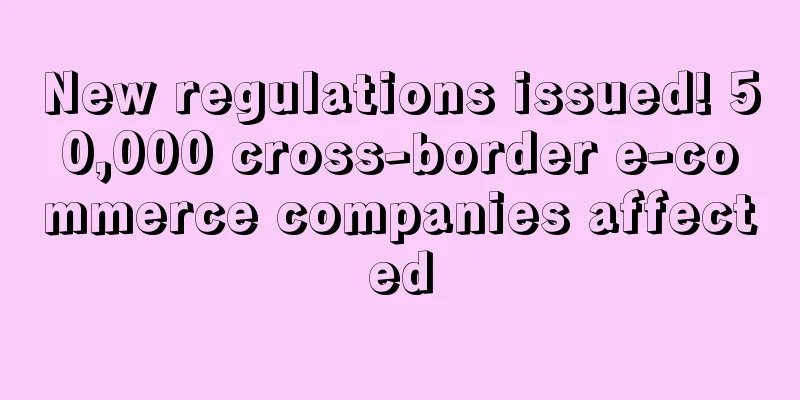New regulations issued! 50,000 cross-border e-commerce companies affected

|
Recently, the cross-border circle has been discussing one thing - what impact will the new "Company Law" to be implemented in July have on sellers.
Cross-border e-commerce sellers are worried about paying the registered capital within 5 years
On December 29, 2023, the Seventh Session of the Standing Committee of the Fourteenth National People's Congress voted to pass the newly revised Company Law, which will come into effect on July 1, 2024.
As soon as this news came out, many cross-border e-commerce sellers were not calm. This is because the new "Company Law" has improved the registration system for the subscription of limited liability companies, and clearly stated that the capital subscription of all shareholders must be paid in full by the shareholders within five years from the date of establishment of the company in accordance with the provisions of the company's articles of association.
"I just registered a company with a registered capital of 4 million." A seller felt that the business license he had just obtained was no longer attractive.
Registered capital is usually considered to be a company's strength, or for the sake of so-called "face", many people will write the registered capital very high. Therefore, looking through the business information of these companies, the registered capital column usually shows a starting point of one million. Some even directly use mobile phone numbers as registered capital, and the registered capital soars to "tens of billions".
"Over the years, the prices have been in the millions, and I have forgotten what the lowest price is," said a seller.
Previously, registered capital was on a subscription basis, which meant that a deadline for paying the capital was set, and the capital had to be paid within that deadline. There was no specific time limit for the time of recognition, as long as it was less than the operating period of the business license. The business license could be used for long-term operation, so many companies wrote that they would subscribe after 30 or even 50 years.
Relevant data show that the average lifespan of small and medium-sized enterprises is less than 7 years, and the average lifespan of large enterprises is less than 40 years. In other words, many companies fail before reaching the subscription period, so they are not lenient when filling in the registered capital.
However, things have changed now. The boasts made in the beginning have been determined to be implemented within 5 years, and the sellers are scared, especially Amazon sellers.
In order to ensure fair competition in the market and facilitate management, Amazon stipulates that a company can only open one store. However, many Amazon sellers usually have more than one store, which means they have multiple companies. Generally speaking, Amazon sellers will fill in a higher registered capital for the company in order to pass the platform's review more easily. If an Amazon seller owns 3 companies, and the registered capital of each company is 2 million yuan, the total amount required to be deposited is 6 million yuan. This is a considerable financial pressure.
Faced with this situation, one seller lamented: "2024 has just started and we have entered difficult mode."
However, this is not an unsolvable problem. The seller can solve it through "capital reduction" and "cancellation".
According to Qichacha, there are currently 53,301 "cross-border e-commerce" limited liability companies with "no paid-in capital", of which 5,717 are in Shenzhen alone. It is conceivable how wide the scope of sellers affected by this wave is. It is reported that the Industrial and Commercial Bureau is now overstaffed, and there must be many cross-border e-commerce sellers among them.
The new regulations have the most obvious impact on sellers who follow and distribute products, as well as sellers who operate multiple accounts. As we all know, there are a large number of shell companies used for follow-selling in the cross-border circle, and it is also normal for distributors to register a large number of companies. Some sellers implement the operation model of selling one product per account. Once paid, there is simply not that much money. Therefore, it is very likely that a wave of "cancellation" is brewing in the cross-border circle.
The new Company Law came very suddenly to sellers, so there are still many questions that need to be answered before preparing to reduce capital or cancel the company.
The answers to the five core questions of sellers are here
The following is a summary of the core questions and answers that sellers are concerned about.
1. Does the 5-year paid-in registered capital refer to newly registered companies or all companies?
Refers to all companies. Not only newly registered companies, but also previously registered companies are required to pay in full. It should be noted that self-employed businesses, partnerships, and sole proprietorships do not need registered capital, so these three types of sellers do not need to worry about the impact of the New Company Law.
2. When does the 5 years start to be calculated?
The five years are calculated from the date of establishment of the company. For example, if the seller's company was established on January 6, 2022, it must be paid up before January 6, 2027. The earlier the establishment, the less time left for payment. According to Qichacha, there are 10,321 "cross-border e-commerce" limited liability companies with "no paid-in capital" that have been established for more than five years nationwide. For these companies, the new "Company Law" has a transition period.
The new "Company Law" will come into effect on July 1, 2024, so there is a transition period of about half a year. During this time, sellers can make some adjustments, such as "capital reduction" or "cancellation".
3. Are there any risks in reducing capital?
No. Many Amazon sellers are worried that capital reduction will trigger an account review or that there are some potential problems. In particular, some sellers’ company names begin with a province, and the registered capital requirements are relatively high. Therefore, when changing the registered capital, the name also needs to be changed, which will cause a greater change. However, small-scale modifications such as registered capital, business scope, and address do not constitute abnormal business status, and the probability of triggering an audit is low.
4. Does the previous cash flow count as actual payment?
No. The so-called paid-in capital refers to the money transferred from the shareholder account to the company account, which is the money transferred by the shareholder to the company and marked as investment funds. The previous cash flow and assets are only the company's income, or the assets converted from income. Within five years, this money can be paid in batches or in one lump sum.
This money can be used for company operations, mainly in two directions: on the one hand, it can be spent externally, for example, the seller can use it to pay the supplier's purchase amount, or pay the logistics company's freight, but corresponding business vouchers (invoices) are required; on the other hand, it can be spent internally, such as paying employee wages, social security, rent, etc., and this part needs to be declared as personal income tax.
It cannot be transferred directly. This is considered as withdrawing registered capital, and you will have to wear a "silver bracelet".
5. The lower the registered capital, the better?
Not really. After the new "Company Law" came out, some sellers planned to reduce the company's registered capital from the original 2 million to 100,000, and some even reduced it to a lower level. In fact, the company's registered capital should be as realistic as possible, and at the same time, it should be planned for the long term, taking into account taxation, business scope, credibility, etc.
Some senior sellers said that if they only engage in trade, the registered capital can be smaller. After all, such companies are under great pressure of cash flow. However, if they are R&D and manufacturing companies, it is recommended that the main company operate in a formal manner. After all, for many customers, small registered capital means that the company has poor risk resistance.
In summary, many people say that the new "Company Law" has caused great financial pressure on enterprises and is not conducive to entrepreneurship, but in the long run, it is conducive to creating a better business environment. The previous subscription system produced a large number of shell companies, which is unfair to real operating companies. At the same time, it has produced many labor phenomena, such as companies with registered capital of hundreds of millions, but not paying employees' wages, and cheating partners.
It is also beneficial from the perspective of the cross-border e-commerce industry. For example, actual payment within five years can reduce the occurrence of copycat sales. In addition, the new horizontal corporate personality denial system stipulated in Article 23 of the new "Company Law" can also have a certain impact on the current chaos in the freight forwarding industry. New Company Law |
<<: Strict investigation! A large number of sellers were forced to abandon their accounts
Recommend
What is Photobucket? Photobucket Review, Features
Photobucket is a service website that provides im...
What is Sixty Six Depo? Sixty Six Depo Review, Features
Sixty Six Depo is a website specializing in outdo...
What is ezymoney? ezymoney Review, Features
Ezymoney will submit transaction data to the partn...
Russians have a special liking for rings, and demand has soared 260%
Russians seem to have a special fondness for prec...
What is Leomax? Leomax Review, Features
Leomax is a leading multi-channel direct retail ho...
Amazon's headcount has soared, but its workers' pay has halved
The report shows that Amazon's quarterly reve...
What is Kuaiyueda Logistics? Kuaiyueda Logistics Review, Features
Guangzhou Kuaiyueda Logistics Co., Ltd. (Kuaiyued...
Amazon's warehouses are seriously full, sellers: Black Friday and Cyber Monday are the fault of unsold goods
"The peak season has become history." A...
What is PG Mall? PG Mall Review, Features
PG Mall is a Malaysian online shopping platform t...
Peruvian online shopping apps are popular, with 73% of buyers choosing Linio for shopping!
With the popularity of the Internet and mobile ap...
Over 47 million views! "Dormitory decorations" become a popular product in the US back-to-school season
Since August, Back to School , the second largest...
After high growth, the market continues to surge. AliExpress semi-hosted merchants lament that "market prices are rising every day"
“It’s very busy because we added semi-custodial s...
What is Ipsy? Ipsy Review, Features
Founded in 2011, Ipsy is currently the largest be...
What is Bieyang Overseas Shopping (Bieyang APP)? Bieyang Overseas Shopping (Bieyang APP) Review, Features
Bieyang APP Overseas Shopping is a very convenient...
What is ADCostly? ADCostly Review, Features
ADCostly is an advertising cost analysis tool tha...









